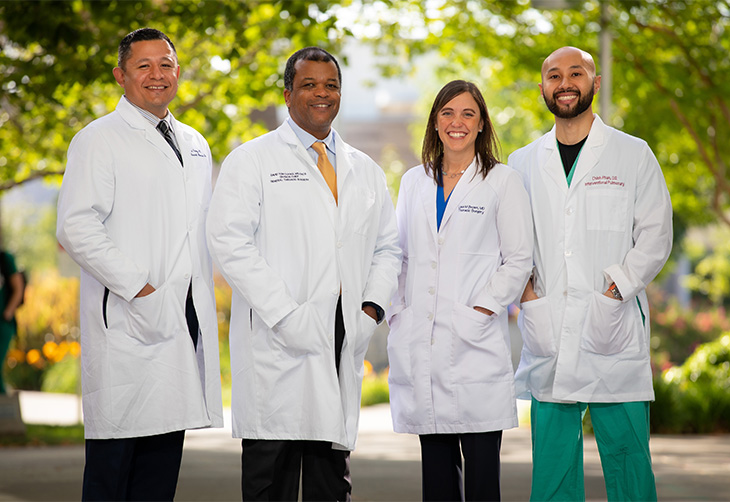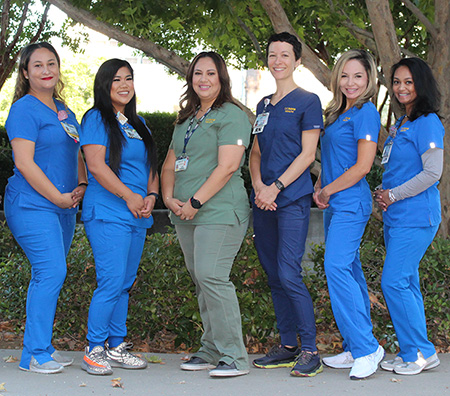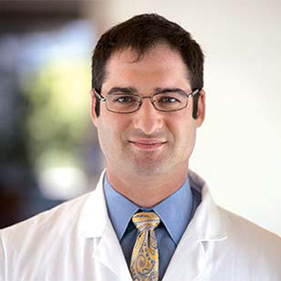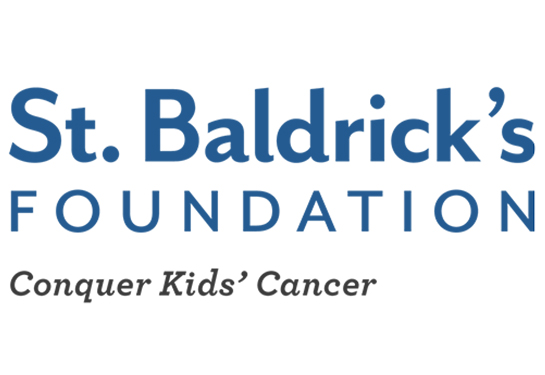UC Davis Comprehensive Cancer Center launches new lung cancer clinic
Multi-faceted approach to catching and curing lung cancer debuts during Lung Cancer Awareness Month
Despite lung cancer being the No. 1 cause of cancer death for both men and women, relatively few people get screened. Only about 1% of those eligible in California are getting checked, which has prompted UC Davis Comprehensive Cancer Center to act.
“We need to address this crisis,” thoracic surgeon David Tom Cooke said. “People who are between 50 and 80 years of age who smoke or who used to smoke need to talk to their doctor about getting screened for lung cancer.”
Cooke, who is chief of the Division of General Thoracic Surgery said that new robotic procedures his team uses make life-saving diagnosis and removal of lung cancer possible during a single surgery — but eligible patients must be screened to detect the lung cancer before it spreads.
“Most of the lung cancer patients I operate on were never screened,” Cooke said. “Many come to me only after they experience symptoms, which usually means the cancer has progressed to a more advanced stage when it is harder to treat.”
The launch of the cancer center’s new Lung Cancer, Lung Nodule Early Detection (Lung-LEAD) Clinic comes this month as Lung Cancer Awareness Month gets underway.
“It all starts with getting eligible patients in to be screened for lung cancer,” said Cooke who will serve as associate physician lead of the new lung cancer integrated service line that is starting the new clinic.

Innovative approach to reaching patients who should be screened
Cancer center providers are conducting comprehensive lung cancer screening outreach with UC Davis Health primary care patients. The Lung-LEAD Clinic has dedicated “lung care navigators” who reach out to eligible patients to conduct virtual screenings. If patients are willing and meet the criteria, then the navigators schedule an appointment with an advanced practice provider to discuss receiving a low-dose CT scan to check for lung cancer.
New lung cancer screening guidelines:
- 50 – 80 years old
- Smoked 20 “pack-years” and either still smokes or quit within the past 15 years
Pack-year means smoking a pack of cigarettes a day for a year or an equivalent amount
Low-dose CT scans take less than five minutes to complete, and do not require any injections or blood draws. They’re called “low-dose” because the radiation delivered is far less than that of conventional CT scans.
“Getting a low-dose CT scan is painless and patients don’t even need to remove their clothes or shoes,” said Chinh Phan, director of the UC Davis Health Interventional Pulmonology Program. “In many ways, low-dose CT scans are much easier than getting a mammogram.”
The idea is for UC Davis Health primary clinics to initiate contact with patients rather than wait for patients to schedule a checkup with their physician, similar to what is done to schedule a mammogram.

“There is a stigma associated with smoking that, frankly, prevents a lot of people from bringing up getting a lung cancer screening with their doctor,” Phan said. “There is no judgment here. Tobacco addiction is tremendously powerful and harmful. With 80% of all lung cancer tied to tobacco use, we have to talk about it openly and encourage our patients to get screened so that, if they do get lung cancer, it is caught early when there’s a best chance for it to be cured.”
“Early detection of lung cancer through a low-dose CT scan offers vital advantages,” said Jonathan Reiss, medical director of Thoracic Oncology and the physician lead for the Lung-LEAD Clinic. “By identifying potential early-stage lung cancer before symptoms arise and it spreads, we can bring to bear timely interventions and treatments such as surgery or focused radiation, thereby improving the chance of a cure. Our multidisciplinary team will work diligently to make sure our patients will get timely, leading-edge treatments.”
Our multidisciplinary team will work diligently to make sure our patients will get timely, leading-edge treatments.”—Jonathan Riess, Medical director, Thoracic Oncology, Physician lead for the Lung-LEAD Clinic
Educating and updating physicians in the community
As part of the new lung cancer integrated service line, UC Davis Health is providing educational material to doctors and other health care providers in the region on the new Lung-LEAD Clinic. Primary care physicians will also learn about new federal guidelines that qualify patients more easily for low-dose lung cancer CT screening.
“We know our UC Davis Health primary care physicians are committed to their patients' well-being,” said Kristin Mensonides, executive director of UC Davis Health integrated service lines. “They will be a key factor in the success of this new program and potentially save lives through early detection and intervention.”
To increase screening of eligible patients, UC Davis Health will take the following steps:
- Established patients with an upcoming primary care appointment will be flagged as eligible for screening if they are aged 50–80 and have a history of smoking.
- New patients meeting the age and smoking criteria will be flagged as eligible for screening following their first primary care appointment.
Patients whose screening through the Lung-LEAD Clinic reveals a lung nodule are quickly scheduled with specialists at UC Davis Comprehensive Cancer Center for further testing. If cancer is confirmed, they are prepared for lung cancer surgery or other treatments, including potential enrollment in innovative clinical trials. A new lung cancer survivorship and surveillance program is also in place for those who do go through treatment.
For more information on the Lung-LEAD Clinic, call 916-703-7050.
UC Davis Comprehensive Cancer Center
UC Davis Comprehensive Cancer Center is the only National Cancer Institute-designated center serving the Central Valley and inland Northern California, a region of more than 6 million people. Its specialists provide compassionate, comprehensive care for more than 100,000 adults and children every year and access to more than 200 active clinical trials at any given time. Its innovative research program engages more than 240 scientists at UC Davis who work collaboratively to advance discovery of new tools to diagnose and treat cancer. Patients have access to leading-edge care, including immunotherapy and other targeted treatments. Its Office of Community Outreach and Engagement addresses disparities in cancer outcomes across diverse populations, and the cancer center provides comprehensive education and workforce development programs for the next generation of clinicians and scientists. For more information, visit cancer.ucdavis.edu.





